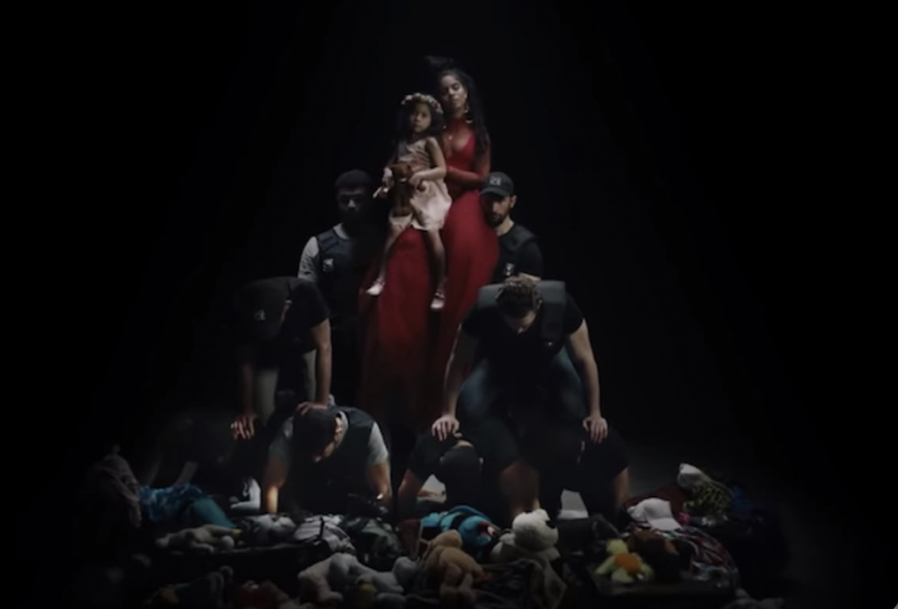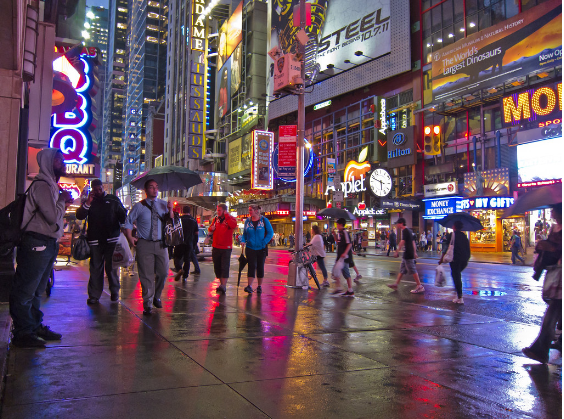Bigger than music
A close up on the immigration crisis and the song “Far Away” by Jessie Reyez
“Far Away” music video directed by Peter Huang, song written by Jessie Reyez and produced by Mad Ruk Entertainment
January 8, 2020
The 117 year old plaque on the Statue of Liberty reads, “Give me your tired, your poor, your huddled masses yearning to breathe free, the wretched refuse of your teeming shore. Send these, the homeless, tempest-tossed to me, I lift my lamp beside the golden door!”
America… a land built on the promise of open arms and produced by the hands of the enslaved, the colored, and the poor. Our history consists of thousands of years of forcing people in and out of America, but today in 2020, a poison has come to show its face in the midst of what was supposed to be, “the land of the free and the home of the brave.”
It is no secret that there is a crisis going on. A humanitarian crisis at that. Thousands of families have spent this past holiday season away from the people they know and love. Many already at risk for having their loved ones ripped away. Even with so many unfortunate occurrences around the world, the era we are in today allows voices to be heard that people in power don’t necessarily want us to hear.
Canadian born singer/songwriter Jessie Reyez is one of the many artists that delivers gut- wrenching stories through the sweetest of melodies. This legend in the making is someone you want to pay close attention to. If this is an introduction to this young talent, listen closely, if this is a reintroduction, you already know to stick around.
Samantha Ramos, NYC iSchool senior says, “If an artist believes in the cause and make music for it, it’s going to really move people because of that influence and immigration is another one of those causes that’s really going to touch people.”
Music is one of the bridges that connects real stories to real people and real hearts. The story for today happens to be Immigration, and the soundtrack for this horrid tale… “Far Away” by Jessie Reyez.
A Little About The System
It is well known that American immigraton has been a huge subject of conversation, especially in the last few years. When the Trump administration took power, a backwards but familiar outlook of the immigration crisis was projected onto Americans. Xenophobia has been at full volume and foreign marginalized communities continue to be the targeted group when it comes to these debates.
Not only are families being separated but people are being falsely punished and criminalization of poverty is taking full effect. Searching for refuge or seeking better lives should not be considered criminal activity and these humans should not be treated like they are terrible people that have committed horrible crimes, because the fact is that they just are not.
According to U.S.A. Today, oftentimes when government constructed shelters run out of space, people, who are waiting for documentation to be cleared for citizenship, end up in detention centers, which is where the “criminals” are held. People end up here if they are in violation of their visas or have no legal authorization to have moved into America (those that are subject to deportation).
They also have very little representation seeing as there were never enough immigration lawyers to account for the thousands of families in need. Each lawyer takes on about 50 to 200 cases at a time, usually not charging the clientele (working pro bono). Vox explains that, “Before the Trump Administration’s policy went into effect, one attorney could represent a whole family. But now that previously accompanied children are being re-designated as unaccompanied, the parents and kids need separate attorneys.”
The people held in these awful places are not criminals but rather people who have been tired of waiting for the system to fail them yet again and decided to approach immigration without going through government processing (often takes up to decades to complete), yet these people are considered illegal aliens.
Reyez recently visited the Mexican/American border: “I went with my team and what we saw and learned was intense. There’s a waiting list to get in the United States that’s approx 30,000 long; people, families, kids looking for refuge, but the system set up to help them is just not working- it’s set up to be as difficult as possible- even the way the number is announced, every day they say what number they are on, and it gets posted outside the border and if you don’t show up on that day, you get taken off. Some that get turned away or sent back, get thrown into these holding cells that have the most ridiculous inhumane conditions.”
The detention centers are in no way a benevolent approach to these types of situations. They are giant cages with insufficient living conditions, holding hundreds and hundreds of people, including a vast number of children. A doctor that spoke with The Atlantic described the detention bases as “torture facilities.”
The water provided was “of a dark color, and an ordinary glass would collect a thick sediment from the sun and rain and night dews, was what we could make by stretching over us our coats or scraps of blanket” and the food was described as “too foul to be touched or too raw to be digested,” says The Atlantic. They experience extremely cold temperatures, lights on 24 hours a day, bad medical care, and sanitation. People are often left with no soap or toothpaste, or any basic necessities for proper hygiene to ensue.
A student of the NYC iSchool community, who wishes to remain anonymous, says, “I’ve heard that they are treated very inhumanly in those detention centers and it is very disappointing to know that our country which promised us freedom keeps people from their families and has broken their promise.”
They then go on to say, “The process for my grandma to get to this country was very nerve- wracking. She had to take a plane ticket to Mexico and then be in a packed truck with dozens of other people. She had to illegally cross the border in this truck and the nerve-wrecking part is the risk of them getting caught by the border police. Luckily, she made it however one should not go through this type of struggle just to have a better life.”
It is no coincidence that the faces we see on the news and in these facilities are black and brown. This country has a deep history of turning away minorities if they don’t benefit the “white man” in one way or another. In keeping with The Atlantic, “Places of forced relocation of civilians into detention on the basis of group identity… detainees [are]… held because of their racial, cultural, religious, or political identity, not because of any prosecutable offense…”
Reyez states, “Unfortunately racism and colorism is still a really big issue, even in 2020. You can one of two perspectives; you can be a cynic and say that not a lot has changed and that the only thing that has changed is this cloak of political correctness, but the undertone of prejudice is still very much present- or you can be an optimist and embrace that in this new age of communication, minorities and the oppressed have an opportunity to take the mic and actually speak to the masses. I prefer the latter and I hope this generation can make more solid change and we can continue to evolve into a more empathetic society.”
The Song
“Far Away” was released on October 4t, 2019. The music video for the song is one that shows different perspectives on immigration – one coming from a prejudice American point of view and the other from an immigrant family. Reyez acts out the love interest of a man who is raided by ICE and taken into their custody. The music video then goes on to tell a story which happens to be a painful reality for many families that face persecution during the immigration process.
On Sway’s Universe, Reyez describes the song as, “something that [wasn’t] premeditated, the song when I wrote it, it was just black and white about long distance love, as basic as it can be, about being ripped away from someone that feels like home to you. Afterwards it was the line in the song, “the government wants us to break up” that kept jumping out to me and then I linked up with [the director] Peter Huang.”
With the song alone, one might not think too much about the immigration side of things, seeing as the only line that explicitly lays out the underlying message is “the government wants us to break up.”
Reyez explains, “the government wants us to break up has multiple meanings. The most obvious is how it applies to the way that a lot of Latino families are being broken up right now however, often times there’s a lot of corruption in government, and it’s easier to control large groups of people if they are divided. However when people unite, that’s when we see massive change.” When the song is then paired with the visuals (Music Video Available on YouTube), we can see that it is more than just unequivocal love.
Dealing with such upscale problems, it’s easy to ask, “what next?” “What do we do now?” or “how do we move forward?”
Reyez hopes “that countries facing immigration issues find better solutions that allow us to coexist as people on a planet and not so much as enemies divided by borders. If we as a society in general view our neighbors like brothers and sisters, we might be more inclined to offer refuge, if we realize that in another life the roles could just as easily be reversed and we could have the shorter end of the stick. Would we want a helping hand if we were the ones in need?”
What really stuck out is the fact that Reyez can pair a song about long distance love with captivating visuals that tell a story and communicates a political statement at the same time. The end of the video also displays a URL to her website to show how to be apart of the change. On the site there is a layout of organizations and nonprofits dedicated to seeking change like ACLU, Al Otro Lado, Florence Immigration and Refugee Rights Project. Reyez says, “I recently took a trip to the border with this organization called Al Otro Lado; they’re a cross border, direct legal service, non-profit organization. They help to coordinate and provide screening, advocacy, and legal representation to deportees and other individuals relating to immigration, civil rights, and other legal needs.”
Reyez tells Clash magazine that she wants to leave behind “something bigger than music,” a legacy. The stories that she tells through song is indeed bigger than music. We cannot wait to see what stories she decides to tell next.












